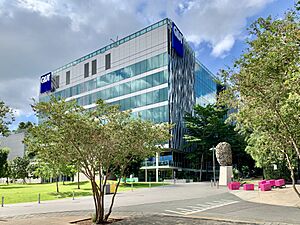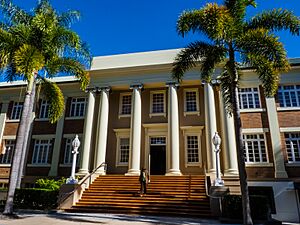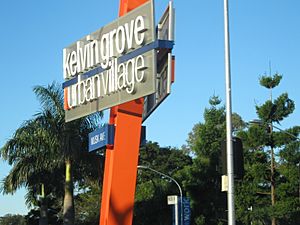Queensland University of Technology facts for kids
 |
|
|
Former name
|
|
|---|---|
| Motto |
The university for the real world
|
| Type | Public research university |
| Established | 1849 (antecedent) 1989 (current state) |
| Accreditation | TEQSA |
| Budget | A$1.21 billion (2023) |
| Chancellor | Ann Sherry |
| Vice-Chancellor | Margaret Sheil |
|
Academic staff
|
2,140 (FTE, 2023) |
|
Administrative staff
|
2,369 (FTE, 2023) |
|
Total staff
|
4,509 (FTE, 2023) |
| Students | 52,073 (2023) |
| Undergraduates | 37,487 (2023) |
| Postgraduates | 11,453 coursework 2,339 research (2023) |
|
Other students
|
794 (2023) |
| Location |
,
,
27°28′37″S 153°01′41″E / 27.47694°S 153.02806°E |
| Campus | Urban and parkland with multiple sites |
| Colours | Blue |
|
Sporting affiliations
|
|
| Mascot | Tank the Tiger |
The Queensland University of Technology (often called QUT) is a big public university in Brisbane, Queensland, Australia. It's a place where students go to learn and do important research. QUT has two main campuses: one is a modern city campus at Gardens Point, and the other is a historical campus at Kelvin Grove. At QUT, you can study many different subjects like architecture, engineering, computer science, health, teaching, law, arts, design, science, and maths.
QUT started as the Queensland Institute of Technology (QIT) in 1965. It officially became a university in January 1989, after the Parliament of Queensland passed a law in 1988. In 1990, the Brisbane College of Advanced Education, which had been around since 1849, joined QUT. This helped QUT grow and expand to its Kelvin Grove campus.
In 2022, QUT had over 50,000 students, including those studying for their first degree and those doing advanced studies. It is the eighth largest university in Australia by student numbers and the second largest in Queensland.
QUT used to be part of a group called the Australian Technology Network of universities, but it left that group in 2018. The QUT Business School is very special because it has "Triple Crown" accreditation. This means it's recognized by three important international groups: the Association to Advance Collegiate Schools of Business, the Association of MBAs, and EQUIS. This shows it's one of the best business schools in Australia.
Contents
QUT's History
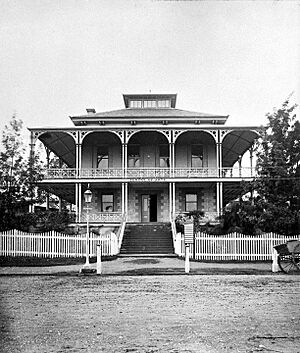
The Queensland University of Technology (QUT) has a long history, going all the way back to 1849 when the Brisbane School of Arts was first created. The Queensland Institute of Technology (QIT) took over from the Central Technical College in 1965. The university we know today, QUT, was officially started in 1989.
Here are some of the earlier schools that became part of QUT:
- Brisbane School of Arts (1849–1881)
- Brisbane Technical College (1882–1907)
- Central Technical College (1908–1964)
- Queensland Institute of Technology (1965–1988)
Another important part of QUT's history is the Brisbane College of Advanced Education, which was formed in 1982. This college was also made up of several older schools, including:
- Brisbane Kindergarten Training College (1911)
- Queensland Teachers' Training College (1914)
- Kelvin Grove Teachers College (1961)
- Kedron Park Teachers College (1961)
In 1988, a special law called the Queensland University of Technology Act was passed. This law gave the Queensland Institute of Technology (QIT) the right to become a university. So, QIT became QUT in January 1989. The Brisbane College of Advanced Education then joined QUT in 1990.
The Gardens Point campus used to be where the former Government House of Queensland was located in the 1800s. In 1909, when the governor's home moved, the Old Government House and the land around it were set aside for a university and a technical college. The first university on this site was the University of Queensland, which later moved to St Lucia in 1945.
QUT Campuses and Buildings
Gardens Point Campus
The Gardens Point campus is right in the middle of Brisbane city. It's next to the Brisbane River and close to the City Botanic Gardens and the Queensland Parliament House. The Old Government House, built in 1862, is a central part of this campus and was reopened in 2009.
This campus is home to the faculties of Business, Law, and Science and Engineering.
Gardens Cultural Precinct
The Gardens Point campus also has the Gardens Cultural Precinct. This area includes the Gardens Theatre and the QUT Art Museum, which both have many shows and exhibitions.
- The QUT Art Museum displays the university's art collection. It mainly focuses on modern Australian art, including paintings, sculptures, and other artworks. The museum opened in 2000 and has welcomed many visitors.
- The Gardens Theatre hosts professional plays, shows for children, and performances by students. It was renovated and reopened in 1999. It's the only theatre complex in Brisbane's city center.
Science and Engineering Precinct
The Science and Engineering Precinct was finished in 2012. It brings together teaching and research for science, technology, engineering, and maths subjects. This big project cost A$200 million, with money coming from QUT, the Australian Government, the Queensland Government, and a group called Atlantic Philanthropies.

Kelvin Grove Campus
The Kelvin Grove campus is where the faculties of Creative Industries, Education, and Health are located. It also has the QUT International College and the Institute of Health and Biomedical Innovation.
The QUT Kelvin Grove Health Clinics offer health services that are free or low-cost for students, staff, and the public.
The Creative Industries Precinct at Kelvin Grove campus has many art and exhibition spaces that are open to everyone. These include:
- The Roundhouse Theatre, a large theatre that is home to the La Boite Theatre Company.
- Interactive exhibition spaces.
- An experimental "black-box" theatre for new performances.
- Spaces for multimedia performances.
- Areas to display public artworks.
This precinct cost about $60 million to build. It was built on the site of the Gona Barracks, which was an Australian Army base that closed in 1998.
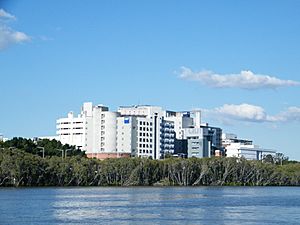
Canberra Executive Education Centre
QUT also has a smaller campus in Canberra, called the Canberra Executive Education Centre (CEEC). This center offers in-person classes for QUT's Executive Master of Business Administration degree. It also provides short courses for professional training and development.
Former Campuses
Caboolture Campus
The Caboolture campus was located about 45 kilometers north of Brisbane. It shared space with TAFE Queensland. This campus offered degrees in business, education, and nursing. However, this campus was transferred to the University of the Sunshine Coast in January 2018.
Carseldine Campus
In 2008, QUT moved all teaching, research, and support activities from the Carseldine campus to the Kelvin Grove and Gardens Point campuses. This campus has since closed. The Queensland Government later renovated the buildings and moved about 1000 government employees there after 2012.
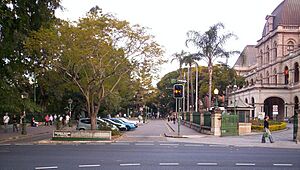
What You Can Study at QUT
QUT offers many different types of courses, from your first university degree to advanced research degrees like Masters and PhDs. Here are some of the fields you can study:
- Architecture
- Business
- Communication
- Creative Industries
- Design
- Education
- Health and Community
- Information Technology
- Law and Justice
- Mathematics
- Science and Engineering
The QUT Business School is one of the best in the world. It has "triple accreditation," which means it's recognized by three major international groups: AMBA, EQUIS, and AACSB. This places it among the top 1% of Business Schools globally.
Queensland Business Leaders Hall of Fame
Since 2009, the State Library of Queensland, the Queensland Library Foundation, and the QUT Business School have worked together to create the Queensland Business Leaders Hall of Fame (QBLHOF). This group celebrates people, companies, and organizations that have made a big difference to Queensland's economy and society. Each year, new members are added to the Hall of Fame at a special event.
Research at QUT
QUT works with businesses, government, and communities to do important research. It is a key member of the Brisbane Diamantina Health Partners, which is Queensland's first academic health science system. QUT receives funding for its research and has many research centers, including:
- Centre of Excellence for the Digital Child
- Centre for Agriculture and the Bioeconomy
- Centre for Biomedical Technologies
- Centre for Data Science
- Centre for Future Enterprise
- Centre for Genomics and Personalised Health
- Centre for Healthcare Transformation
- Centre for Justice
- Centre for Materials Science
- Centre for Robotics
- Digital Media Research Centre
- Australian Cobotics Centre
- Australian Centre for Entrepreneurship Research
- Australian Centre for Health Law Research
- Australian Centre for Health Services Innovation
- Australian Centre for Philanthropy and Nonprofit Studies
- Australia-China Centre for Tissue Engineering and Regenerative Medicine
- Cancer and Palliative Care Outcomes Centre
- Centre for a Waste-Free World
- Centre for Accident Research and Road Safety
- Centre for Behavioural Economics, Society and Technology
- Centre for Clean Energy Technologies and Practices
- Centre for Decent Work and Industry
- Centre for the Digital Economy
- Centre for Future Mobility
- Centre for Immunology and Infection Control
- Centre for Inclusive Education
- Centre for the Environment
- Centre for Vision and Eye Research
- Design Lab
Indigenous Research Centres
- Carumba Institute
- National Indigenous Research and Knowledges Network
Research Facilities
QUT has many special facilities for research, such as:
- Biorefining Research Facility
- Central Analytical Research Facility
- Design and Fabrication Facility
- Digital Observatory
- eResearch
- Medical Engineering Research Facility
- Samford Ecological Research Facility
- Research Engineering Facility
- Visualisation and Interactive Solutions for Engagement and Research
QUT Libraries and Databases
The QUT Library helps students and staff with their learning and research. There are three library branches at QUT: Gardens Point library, Law library, and Kelvin Grove library.
The QUT library spends about $13 million each year to buy subscriptions to academic journals and other materials. It has one of the largest collections of e-books and online videos among universities in Australia and New Zealand.
QUT Library was the first university library in the world to make it a rule in 2003 that research papers should be put into its online collection, called QUT ePrints, so everyone can access them.
QUT's Reputation and Rankings
| University rankings | |
|---|---|
| QS World | 226 |
| ARWU World | 201–300 |
| US News World | =182 |
| Australian rankings | |
Universities are often ranked to see how they compare globally and nationally. In 2024, QUT was ranked around 201st in the world when combining results from major global rankings. It was also ranked 15th nationally in Australia.
Here are some of QUT's recent rankings:
- In the 2024 Australian Financial Review Best Universities Ranking, QUT was ranked 21st among Australian universities.
- In the 2026 Quacquarelli Symonds World University Rankings, QUT was ranked 226th globally and 15th nationally.
- In the 2025 Times Higher Education World University Rankings, QUT was ranked between 201st and 250th globally, and tied for 11th-13th nationally.
- In the 2024 Academic Ranking of World Universities, QUT was ranked between 201st and 300th globally, and tied for 9th-15th nationally.
- In the 2025–2026 U.S. News & World Report Best Global Universities, QUT was ranked 182nd globally and 13th nationally.
Student Success and Employment
The Australian Government surveys students to see how they feel about their university experience and how well they find jobs after graduating.
In 2023, employers were very happy with QUT graduates, with an 83.2% satisfaction rate.
Also in 2023, 81.3% of QUT's undergraduate students found full-time jobs after graduating, and 92.5% of postgraduate students found full-time jobs. The average starting salary for undergraduates was A$70,400, and for postgraduates, it was A$105,000.
When asked about their overall education experience in 2023, 74.9% of undergraduate students and 77.1% of postgraduate students at QUT rated it as good.
Notable People from QUT
Many interesting and successful people have studied or worked at QUT.
See also
 In Spanish: Universidad de Tecnología de Queensland para niños
In Spanish: Universidad de Tecnología de Queensland para niños
- List of universities in Australia
- MacLennan-Hookham suspension
 | Jessica Watkins |
 | Robert Henry Lawrence Jr. |
 | Mae Jemison |
 | Sian Proctor |
 | Guion Bluford |


